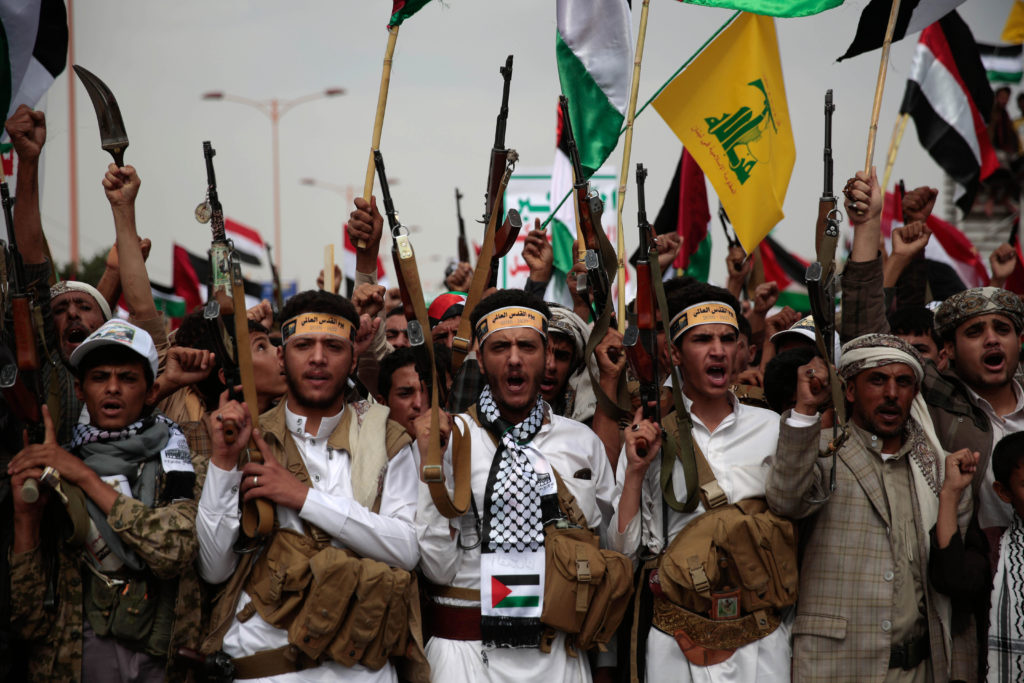Australia/Israel Review
Stopping the Houthis requires thinking bigger
Jan 25, 2024 | Oved Lobel

US President Joe Biden, recently asked by a reporter whether US-led military strikes against the Houthis in Yemen were working, responded, “When you say working, are they stopping the Houthis? No. Are they going to continue? Yes.”
On January 11, after 27 Houthi attacks over several months against both US Navy ships and international vessels in the crucial shipping bottleneck at the mouth of the Red Sea, the US and UK finally decided to respond. With largely rhetorical “support” from Australia and several other countries, the two nations conducted retaliatory strikes against more than 60 Houthi targets utilising more than 150 munitions.
The US has stated that the purpose of these strikes is to degrade the Houthi capability to continue conducting such attacks, and some officials said 20%-30% of Houthi offensive capabilities had been destroyed.
Predictably, these limited strikes appear to have had no deterrent effect on the group, which has since continued to fire on navy and commercial ships, prompting tit-for-tat US strikes against Houthi missiles, drones and launchers multiple times since the initial wave.
The Biden administration also relisted the Houthis as a terrorist organisation, a designation imposed in the last days of the Trump administration and inexplicably lifted almost immediately by its successor.
While these strikes are a step in the right direction compared to the months of inaction preceding them, and while immediate threats like missiles and drones about to be launched should be targeted and destroyed as a matter of course, they cannot achieve a deterrent effect. That can only be achieved by also targeting those actually responsible for these attacks: the Islamic regime ruling Iran and its Islamic Revolutionary Guard Corps (IRGC).
For too long, the US has been engaging in the IRGC’s shell game, pretending that the Houthis, more formally known as Ansar Allah, were a Yemeni problem. The reality is that, like Hezbollah in Lebanon, Hamas and Palestinian Islamic Jihad in Gaza and the West Bank and various militias in Iraq and Syria, Ansar Allah is an IRGC problem.
The administration continues to implausibly insist that the war in Gaza is a contained Israeli-Palestinian issue and that incessant attacks against US forces in Iraq, Syria and off the coast of Yemen are unrelated issues and should be dealt with independently.
The IRGC, as I’ve written before, “is no ordinary national army but the vanguard of a multinational Islamic revolution – a supranational monolith whose nerve centre is located in Iran.” As an organic component of this supranational monolith, Ansar Allah cannot be deterred because it is not an independent decision-maker.
Imagine if the situation were reversed and the Islamic Republic treated every branch of the US military as an independent organisation, each merely backed by or allied with the US government. Whenever the US Air Force struck a regime target, for instance, it would respond only against the air force, never the US Army or Navy, and in a very narrow fashion, with Washington itself never suffering any kind of retaliation. At no stage would they all be treated as a unitary enemy whose decision-making centre was in Washington.
If this seems patently absurd, that is because it is, and it is precisely what the US is doing by trying to compartmentalise the components of the IRGC and deter each one as if it weren’t part of a whole. This approach, for obvious reasons, isn’t working in Iraq and Syria and it clearly won’t work in Yemen.
The Houthis have continued their conquests and attacks through eight years – and really 20 years, as the IRGC officially began the Ansar Allah jihad in Yemen in 2004 – of brutal warfare, including relentless and far more expansive airstrikes by Saudi Arabia; a few desultory targeted strikes by the US and UK against some missiles and drones are not going to stop them. Moreover, Iran can produce, deliver and fire missiles and drones at a much higher rate than the US can destroy them in such strikes.
Iran’s Foreign Minister Hossein Amirabdollahian recently asserted at the World Economic Forum in Davos that “The security of the Red Sea is tied to the developments in Gaza, and everyone will suffer if Israel’s crimes in Gaza do not stop… All the fronts will remain active.”
This is yet another regime admission that it is controlling this multifront war. The Hamas invasion and pogrom on October 7 was merely one front in this IRGC war; Houthi attacks on international shipping and the US Navy are another. This is a single problem set, and the address for a deterrent response lies neither in Gaza nor in Yemen, but in Iran.
Not until the US and its allies stop participating in this shell game and place the theocratic regime behind all these regional attacks under much firmer financial and, yes, kinetic military pressure – to the point that it feels it is jeopardising its existence with continued attacks on shipping – can there be any hope of a genuinely deterrent posture in the Red Sea.






